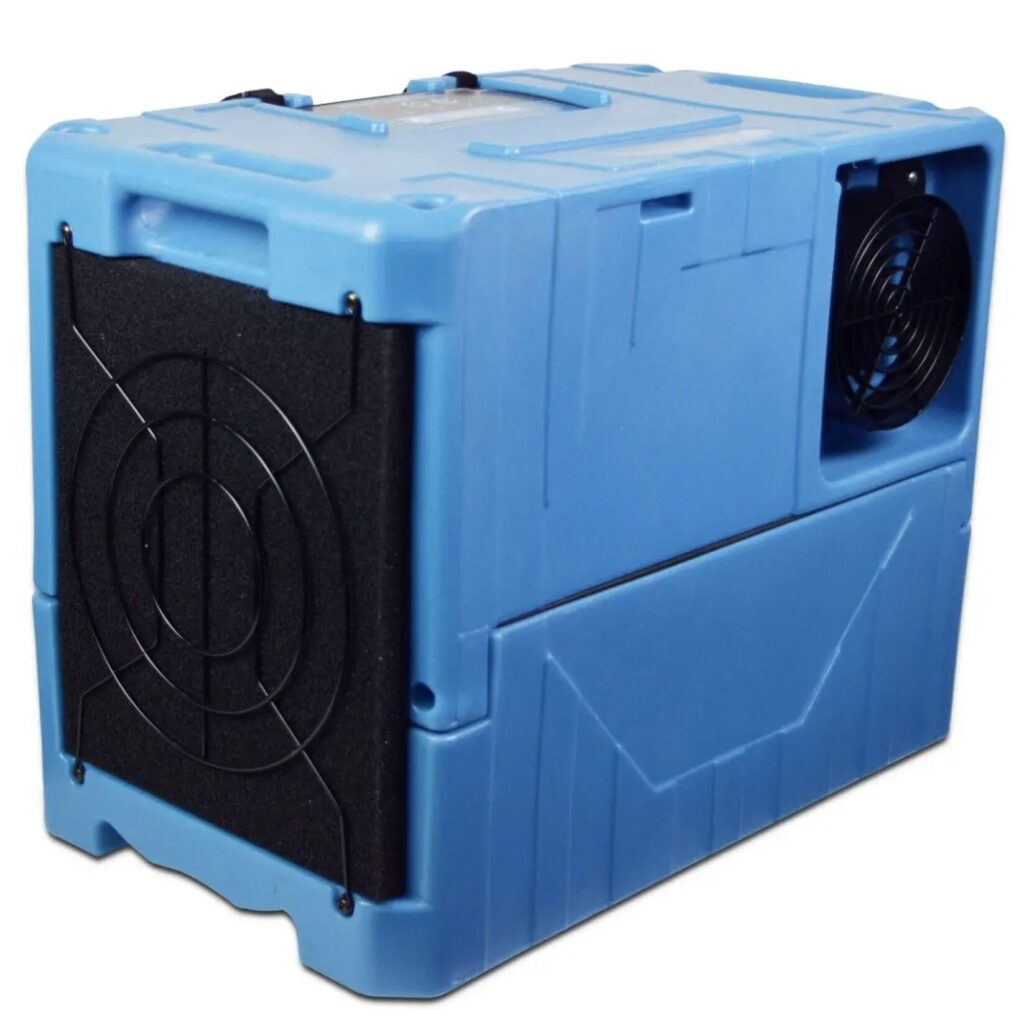
Top Reasons Why Woodworkers And Furniture Manufacturing Need Dehumidifiers
Top Reasons Why Woodworkers And Furniture Manufacturing Need Dehumidifiers
By: Brothers Equipment And Supply
1. Wood Stability
Wood is highly sensitive to fluctuations in humidity. Excessive moisture can cause wood to swell, leading to warping and distortion. Dehumidifiers help maintain a stable environment, ensuring the wood used in furniture manufacturing remains dimensionally stable.
2. Preventing Mold and Mildew
High humidity levels create a breeding ground for mold and mildew, posing a significant threat to both raw materials and finished products. Dehumidifiers actively combat these issues, preserving the integrity and appearance of the wood.
3. Quality Control
Fluctuations in humidity can result in inconsistent wood quality, affecting the overall craftsmanship of furniture. Dehumidifiers provide woodworkers with the ability to maintain precise control over the production environment, ensuring consistent quality in each piece.
4. Drying Efficiency
Woodworkers often need to dry wood before incorporating it into their projects. Dehumidifiers accelerate the drying process by removing excess moisture from the air, enabling efficient and controlled wood drying.
5. Tool Preservation
High humidity levels can lead to rust and corrosion of woodworking tools, affecting their performance and lifespan. Dehumidifiers play a crucial role in preserving the longevity of tools, reducing maintenance costs for woodworking businesses.
6. Employee Comfort and Productivity
Maintaining a comfortable working environment is essential for the well-being and productivity of employees. Dehumidifiers not only contribute to a healthier workplace but also help prevent discomfort caused by excessive humidity.
7. Reduced Finishing Issues
Finish application on wood is a delicate process, and humidity can significantly impact the drying time and quality of finishes. Dehumidifiers mitigate finishing issues by maintaining an optimal humidity level, ensuring a smooth and flawless finish.
8. Energy Efficiency
Wood drying kilns and manufacturing facilities can be energy-intensive. By using dehumidifiers to control humidity levels, businesses can optimize their energy consumption and reduce operational costs.
9. Compliance with Regulations
Some woodworking and furniture manufacturing standards and regulations stipulate specific environmental conditions. Dehumidifiers help businesses meet these requirements, ensuring compliance with industry standards.
10. Enhanced Product Longevity
Ultimately, the use of dehumidifiers contributes to the longevity of the final products. By mitigating the adverse effects of humidity, woodworkers can create furniture that stands the test of time, meeting and exceeding customer expectations.
Benefits Of Dehumidifiers For Woodworkers And Furniture Manufacturing
1. Preservation of Raw Materials
Dehumidifiers protect raw materials such as wood from the detrimental effects of excess moisture, ensuring that the materials used in furniture manufacturing are of the highest quality.
2. Increased Production Efficiency
The controlled environment facilitated by dehumidifiers enhances production efficiency by reducing the time needed for wood drying, minimizing delays in the manufacturing process.
3. Consistent Product Quality
Maintaining a stable humidity level ensures consistent wood quality, allowing woodworkers to produce high-quality furniture with uniform characteristics.
4. Reduction in Waste
By preventing warping, cracking, and other issues caused by humidity, dehumidifiers contribute to a significant reduction in material wastage during the manufacturing process.
5. Cost Savings
Investing in dehumidifiers can lead to long-term cost savings by minimizing the need for rework, reducing energy consumption, and extending the lifespan of tools and equipment.
6. Health and Safety Benefits
Dehumidifiers create a healthier and safer working environment by preventing the growth of mold and mildew, which can have adverse effects on respiratory health.
7. Flexibility in Design and Wood Choices
With controlled humidity levels, woodworkers have the flexibility to experiment with various wood types and designs, knowing that the environmental conditions will not compromise the final product.
8. Improved Workplace Comfort
Employees working in a controlled and comfortable environment are likely to be more productive and satisfied, contributing to a positive workplace culture.
9. Enhanced Reputation
Consistently producing high-quality, durable furniture can enhance a woodworking business’s reputation, leading to increased customer trust and loyalty.
10. Adaptability to Seasonal Changes
Dehumidifiers help woodworkers adapt to seasonal changes in humidity, ensuring that the manufacturing process remains unaffected by external environmental factors.

Top Types Of Dehumidifiers For Woodworking And Furniture Manufacturing Businesses
1. Desiccant Dehumidifiers
Ideal for low-temperature environments, desiccant dehumidifiers use a desiccant material to absorb moisture from the air. They are efficient in controlling humidity levels in woodworking spaces.
2. Refrigeration Dehumidifiers
Commonly used in industrial settings, refrigeration dehumidifiers work by cooling the air, causing moisture to condense and be collected. They are effective in maintaining optimal humidity levels.
3. Whole-House Dehumidifiers
Suitable for larger woodworking facilities, whole-house dehumidifiers integrate with HVAC systems to control humidity throughout the entire space.
4. Commercial Dehumidifiers
Designed for heavy-duty applications, commercial dehumidifiers are robust, high-capacity units suitable for large furniture manufacturing facilities.
5. Portable Dehumidifiers
For smaller woodworking workshops, portable dehumidifiers offer flexibility and ease of use. They can be moved to different areas as needed.
6. Low-Grain Refrigerant (LGR) Dehumidifiers
LGR dehumidifiers are highly effective in removing moisture from the air, making them suitable for demanding woodworking environments where humidity control is critical.

7. Hybrid Dehumidifiers
Combining the strengths of desiccant and refrigeration technologies, hybrid dehumidifiers offer versatility and efficiency in controlling humidity.
8. Ceiling-Mounted Dehumidifiers
Saving floor space, ceiling-mounted dehumidifiers are designed to be discreet while effectively controlling humidity levels in woodworking facilities.
9. Ducted Dehumidifiers
Integrated into the HVAC system, ducted dehumidifiers provide centralized humidity control, making them suitable for large woodworking and manufacturing spaces.
10. Energy-Efficient Dehumidifiers
Designed with energy conservation in mind, these dehumidifiers prioritize efficiency, helping woodworking businesses reduce their environmental footprint and operational costs.
FAQs
1. Q: How does humidity affect wood in woodworking and furniture manufacturing?
A: High humidity can cause wood to absorb moisture, leading to warping, swelling, and other quality issues. Dehumidifiers prevent these problems by maintaining optimal humidity levels.
2. Q: What is the ideal humidity level for woodworking facilities?
A: The ideal humidity level for woodworking is generally between 40% and 60%. This range helps prevent wood-related issues without overly drying the material.
3. Q: Can I use residential dehumidifiers for woodworking?
A: While residential dehumidifiers can be used for small workshops, commercial-grade dehumidifiers are recommended for larger woodworking and manufacturing spaces due to their higher capacity.
4. Q: How do I choose the right dehumidifier for my woodworking business?
A: Consider the size of your space, the level of humidity control required, and the specific features of different dehumidifier types. Consulting with a professional can help determine the most suitable option.
5. Q: Can dehumidifiers prevent wood from cracking during the drying process?
A: Yes, dehumidifiers contribute to a controlled drying process, reducing the likelihood of wood cracking and ensuring a more even and stable drying experience.
6. Q: How often should I run the dehumidifier in my woodworking shop?
A: The frequency of dehumidifier usage depends on the ambient humidity levels, the size of the space, and the specific needs of the woodworking processes. Regular monitoring and adjustments are key.
7. Q: Are dehumidifiers noisy and disruptive in a woodworking environment?
A: Commercial and industrial dehumidifiers are designed to operate with minimal noise. It’s advisable to choose models with noise reduction features for a more comfortable working environment.
8. Q: Can dehumidifiers be used in conjunction with other climate control systems?
A: Yes, dehumidifiers can be integrated with HVAC systems or used alongside air conditioning and heating systems to achieve comprehensive climate control.
9. Q: Do dehumidifiers require regular maintenance?
A: Yes, regular maintenance is essential for optimal dehumidifier performance. This may include cleaning filters, checking refrigerant levels, and ensuring proper drainage.
10. Q: Can dehumidifiers help with finishing processes in woodworking?
A: Absolutely. Dehumidifiers assist in maintaining consistent humidity levels during finishing processes, ensuring that finishes dry evenly and adhere properly to wood surfaces.
If you have any questions about our article “Top Reasons Why Woodworkers And Furniture Manufacturing Need Dehumidifiers” or need commercial dehumidifiers call 416-912-2205 or chat with us in real life on LiveChat or social media.
